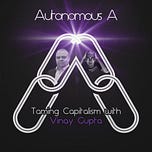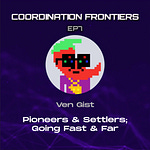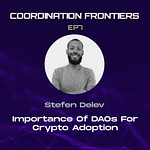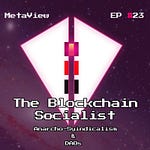Vinay got his start in software engineering, then spent about half his career in defense and energy policy think tanks working on the big “save the world” questions - food, shelter, pandemics, and all the rest of the worst-case scenario planning stuff. Then he decided to get a “real job” and ended up managing the launch of Ethereum back in 2015. Finally, he went on his way to found Mattereum.
The discussion kicks off around the problem of capitalism with being extractive at one end, and polluting at the other end.
How do we produce higher quality of life on a massively reduced environmental footprint?
The 4 Steps of Capitalism
Investment, Production, Consumption & Waste. The first three have been massively optimized, but we're still lacking good data & incentives to optimize the final step and loop it back into step 1. Which is where Mattereum comes into play, linking physical with digital & creating a data trail feeding back the product performance to producers.
Other than closing Capitalism's feedback loop, Mattereum will make second hand markets orders of magnitude more efficient by tying code with law - the real world kind - and allowing the disputes arising in the digital sphere to be solved through insurance or escalated to real world courts.
Armed with data & enabled by efficient second hand markets, we become custodians of assets rather consumers. Because you now expect to eventually sell the things you buy - you stop consuming things and start investing in things; buying higher quality goods & turning from a consumer to an investor.
Some of the topics
Issues with extractive capitalism
Connecting Ethereum to legacy legal systems
Permanent Investment economies
Social Operating Systems
Anarcho-syndicalism
“Consumption is a thing that we cannot afford in a world with a billion starving people. But investment is how we take what we have and turn it into what we need. Everything that we buy ought to be something that generates wealth not just for us, but also for the world. And if we take this mindset of a permanent investment economy rather than a consumption economy, and if we hate losing money because our goods are degrading and being thrown away - pretty soon we won't be producing or buying "cheap" goods that break.
Vinay and Peth then dig into MetaGame
“I think you’ve done really really good work in terms of identifying this kind of a social operating system. You’ve got materials about values, ways of relating to other people, methodology, there’s all this layer, then there’s an economics layer, and the activities layer. So values, economic incentives, and activities layers - similar problem solving capacity to a conventional corporation, but run very strongly on internal markets and a different set of protocols.
[If you say] you know, we’re building software to support anarcho-syndicalist economic democracies, there aren’t many people you can say that to and have their eyes light up, but that is actually what you’re doing and it’s super impressive, it’s really really good.”
Resources:
The Future of Stuff by Vinay Gupta
--- Send in a voice message: https://anchor.fm/metagame/message










